The Collaborative Authoring Tools Market is estimated to be valued at USD 2.6 billion in 2025 and is projected to reach USD 8.8 billion by 2035, registering a compound annual growth rate (CAGR) of 13.1% over the forecast period.
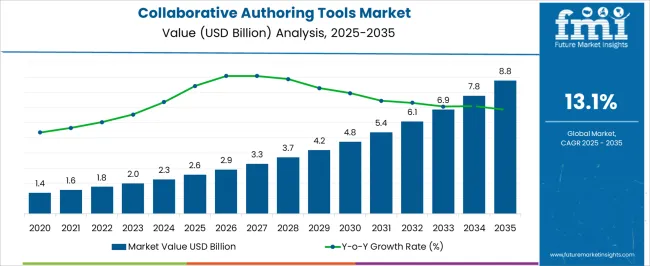
| Metric | Value |
|---|---|
| Collaborative Authoring Tools Market Estimated Value in (2025 E) | USD 2.6 billion |
| Collaborative Authoring Tools Market Forecast Value in (2035 F) | USD 8.8 billion |
| Forecast CAGR (2025 to 2035) | 13.1% |
The collaborative authoring tools market is undergoing robust expansion as businesses prioritize real-time content development, distributed workforce enablement, and seamless communication across teams. Accelerated digital transformation initiatives have prompted enterprises to replace static documentation processes with dynamic, co-editable platforms. Cloud-native deployment models are enabling continuous accessibility, version control, and cross-platform interoperability, which are essential for hybrid and remote work environments.
The rise of asynchronous workflows and integrated messaging, supported by APIs and unified dashboards, is fueling adoption across sectors such as education, media, legal, and IT services. Demand for scalability, data security, and compliance support has also influenced product development, as regulatory scrutiny over data-sharing intensifies.
Market momentum is further being supported by mergers and product enhancements among SaaS providers to offer bundled collaboration ecosystems. As organizations seek to streamline knowledge sharing and accelerate documentation cycles, the market is poised for consistent growth led by platform innovation and cross-functional utility.
The market is segmented by Deployment, Component, Application, and Type and region. By Deployment, the market is divided into Cloud and On-Premise. In terms of Component, the market is classified into Solution and Services. Based on Application, the market is segmented into Web Conferencing, E-Mail Server, Instant Messaging, and Others. By Type, the market is divided into Website Authoring Tools and Multimedia Authoring Tools. Regionally, the market is classified into North America, Latin America, Western Europe, Eastern Europe, Balkan & Baltic Countries, Russia & Belarus, Central Asia, East Asia, South Asia & Pacific, and the Middle East & Africa.
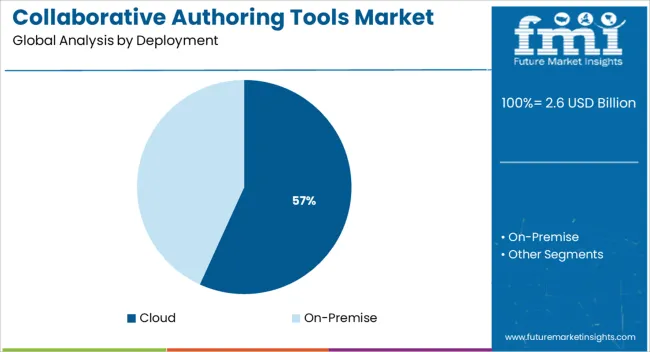
Cloud deployment is projected to account for 56.8% of total market revenue in 2025, positioning it as the dominant delivery model. This leadership is being driven by the need for scalable infrastructure, real-time document access, and reduced IT overheads.
Cloud-based collaborative authoring platforms support team collaboration across locations without the constraints of on-premise setups, enabling document versioning, real-time updates, and multi-device access. The flexibility to integrate with third-party applications, including content management systems and communication platforms, has made cloud solutions highly preferred among enterprise and SMB users.
Data encryption, disaster recovery, and regulatory compliance have also been prioritized by leading vendors, enhancing the trust and adoption of cloud deployments. As organizations expand remote work policies and embrace digital documentation at scale, the cloud model is expected to maintain its competitive edge across global markets.
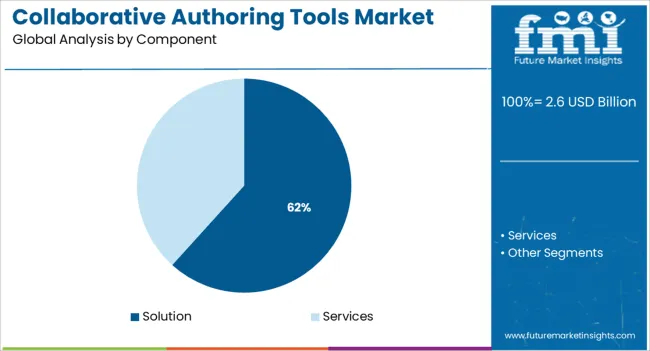
The solution component segment is expected to contribute 61.7% of total revenue in 2025, making it the leading segment by component. This dominance is attributed to increased demand for integrated toolsets that enable co-authoring, file sharing, version control, and access management.
End users have shown preference for all-in-one platforms that eliminate the need for multiple standalone tools and streamline workflow management. These platforms are being designed with AI-assisted editing, multilingual support, and automation features that cater to the needs of technical writers, content teams, and legal documentation professionals.
The shift toward enterprise-wide standardization of collaborative authoring solutions has further reinforced their adoption. With a growing number of businesses prioritizing secure, interoperable, and scalable documentation frameworks, solution components are projected to retain their market leadership position.
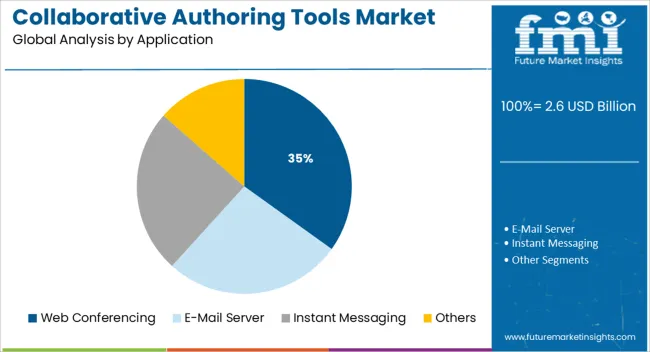
Web conferencing is projected to account for 34.9% of total revenue in 2025 within the application segment, ranking it as the leading use case. This segment’s strength is being driven by its central role in enabling real-time discussions, editing collaboration, and document review sessions in distributed environments.
The integration of collaborative authoring tools with conferencing platforms allows teams to co-edit documents live during meetings, enhancing decision-making and reducing revision cycles. Increased adoption of remote and hybrid work models has elevated the need for seamless transitions between voice, video, and document collaboration.
Vendors are optimizing these workflows by embedding editing panes, chat integrations, and content sharing features directly within conferencing interfaces. As companies continue to invest in employee productivity and collaborative efficiency, web conferencing is expected to remain the most widely utilized application segment in the collaborative authoring tools market.
Collaborative authoring tools market growth is attributed to several factors, such as:
Intensifying E-learning Adoption: Increasing adoption of E-learning worldwide is driving the demand for authoring tools. Increased internet penetration has led to an increase in online degrees and studies. For instance, an open-source authoring tool was launched by Google in 2020. The authoring tool is targeted at all educational levels, including K-12, college, and higher education.
Utilization of Cloud Computing: Among the other factors driving the demand for authoring tools soon is the implementation of cloud computing, peer-to-peer problem-solving, open content development, and the rapid growth of the target audience.
Cost Efficient: Globally, collaborative authoring tools are growing in popularity due to features such as user commitment to effective, efficient, and easier work processes. Another factor contributing to the market growth is cost-effectiveness and the ease of sharing data through revision tracking.
Several factors hamper the global growth of collaborative authoring tools, including communication issues and time zone differences. Another factor hampering the growth of collaborative authoring tools is the type of training required by organizations, such as asynchronous learning and instructor-led training (ILT).
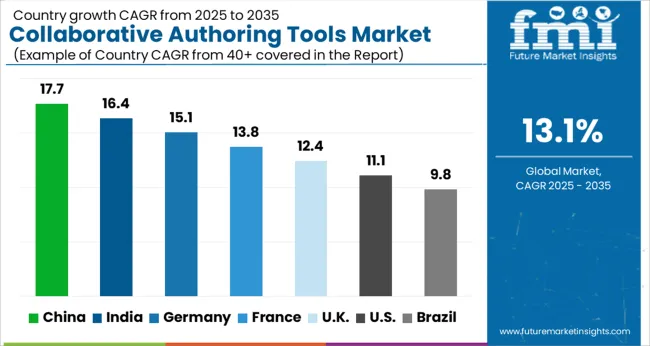
North America is expected to be the key contributor to the growth of the global collaborative authoring tools market accounting for 35.9% of the market share. Due to the growing adoption of digitalization in organizations and industrialization, North America dominates the authoring tool market. Additionally, strict lockdowns in countries increase the demand for authoring tools due to the growth of web conferencing and video conferencing in enterprises.
It is anticipated that the uptake of 5G technology in several industries, including healthcare, retail, and others, will drive market growth over the forecast period. According to estimates, 45% of North American consumers may adopt 5G technology by 2025, due to the huge demand for mobile data and video streaming services.
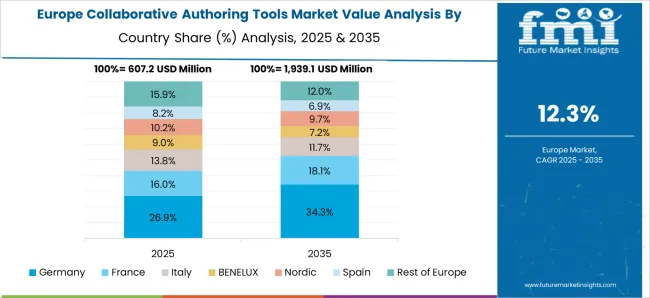
Europe is predicted to hold a market share of 22.1% of the global market for collaborative authoring tools. It is the Information and Communication Technology (ICT) sector of the European Union (EU) which is contributing the most value to the collaborative authoring tools market in Europe. In terms of the commercialization of collaborative authoring tools, Western Europe is expected to be the most significant market.
In the authoring tool market, the Asia Pacific region is expected to hold the largest share of the market during the forecast period. Collaborative authoring tools have risen in demand due to rapid technological innovations, the adoption of advanced technology, and the expansion of SMEs.
Moreover, rising smartphone penetration in developed economies is a prominent factor projected to drive authoring tool demand during the forecast period. For example, according to the GSMA, Asia Pacific had 64% mobile subscribers in 2020 and is expected to reach 81% by 2025.
The authoring tool market is highly fragmented due to numerous manufacturers in both developed and emerging regions. Companies in the authoring tool market are increasingly investing in research and development to develop new and innovative techniques to provide innovative tool solutions.
In the collaborative authoring tools market, there is a growing demand for mobile learning applications, which are still in their infancy. Moreover, advanced features such as real-time videos allow experts to capture their knowledge and instructions.
Drawings, presentations, spreadsheets, and documents are often edited collaboratively in many working environments. Nowadays, collaborative authoring tools are equipped with features such as synchronous editing, revision, comments, group membership, etc. As a result of these features, collaborative authoring tools are the backbone of the commercial industry.
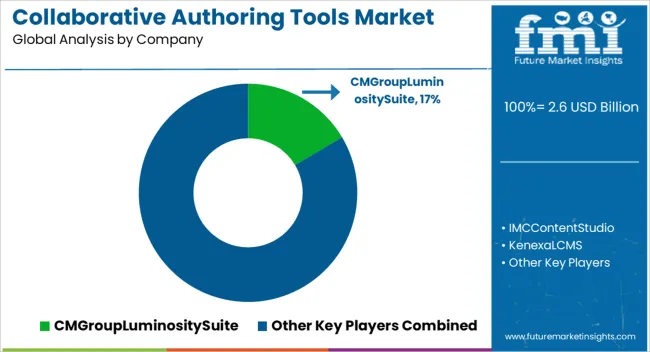
Two of the world's largest corporations, RBS and Microsoft, have already adopted the secure, scalable and flexible Luminosity Motion mobile learning platform. As a result of the official launch, this innovative learning concept may now be available to organizations of all sizes. This will enable them to provide learning and support wherever learners are and whenever they need it.
Main players operating in the global authoring tool market include:
CM Group: The CM Group specializes in the design and creation of advanced learning solutions for large international corporations. The HTML5-based eLearning courses are created using Luminosity Studio, the advanced collaborative rapid authoring software. In addition to the end-to-end mobile learning solutions, it offers responsive HTML5 content suitable for consumption on tablets and smartphones, cloud-based hosting and delivery through our Luminosity Motion mobile learning platform, along with Luminosity Mentor BYOD Apps.
IMC Content Studio: In particular, IMC Content Studio is an educational authoring tool for the creation of content for e-learning areas, such as MOOCs. German company IMC AG, based in Saarbrucken, developed and distributed the program. Occupational Training Institutions such as Corporate Universities use the software in adult education and continuing education.
Some other major key players of the collaborative authoring tools are:
| Report Attribute | Details |
|---|---|
| Growth Rate | CAGR of 13.1% from 2025 to 2035 |
| Base Year for Estimation | 2025 |
| Historical Data | 2020 to 2024 |
| Forecast Period | 2025 to 2035 |
| Quantitative Units | Revenue in USD Million and CAGR from 2025 to 2035 |
| Report Coverage | Revenue Forecast, Volume Forecast, Company Ranking, Competitive Landscape, Growth Factors, Trends and Pricing Analysis |
| Segments Covered | Deployment, Component, Applications, Type, Region |
| Regions Covered | North America; Latin America; The Asia Pacific; MEA; Europe |
| Key Countries Profiled | The USA, Canada, Brazil, Argentina, Germany, The UK, France, Spain, Italy, Nordics, BENELUX, Australia & New Zealand, China, India, GCC, South Africa |
| Key Companies Profiled | CM Group; IMC Content Studio; Kenexa LCMS; Adobe Presenter; Lectora Publisher; Sana Software EasyGenerator; Xyleme LCMS; CrossKnowledge Mohive; Infor ContentCreator; Adobe Captivate |
| Customization | Available Upon Request |
The global collaborative authoring tools market is estimated to be valued at USD 2.6 billion in 2025.
The market size for the collaborative authoring tools market is projected to reach USD 8.8 billion by 2035.
The collaborative authoring tools market is expected to grow at a 13.1% CAGR between 2025 and 2035.
The key product types in collaborative authoring tools market are cloud and on-premise.
In terms of component, solution segment to command 61.7% share in the collaborative authoring tools market in 2025.






Our Research Products

The "Full Research Suite" delivers actionable market intel, deep dives on markets or technologies, so clients act faster, cut risk, and unlock growth.

The Leaderboard benchmarks and ranks top vendors, classifying them as Established Leaders, Leading Challengers, or Disruptors & Challengers.

Locates where complements amplify value and substitutes erode it, forecasting net impact by horizon

We deliver granular, decision-grade intel: market sizing, 5-year forecasts, pricing, adoption, usage, revenue, and operational KPIs—plus competitor tracking, regulation, and value chains—across 60 countries broadly.

Spot the shifts before they hit your P&L. We track inflection points, adoption curves, pricing moves, and ecosystem plays to show where demand is heading, why it is changing, and what to do next across high-growth markets and disruptive tech

Real-time reads of user behavior. We track shifting priorities, perceptions of today’s and next-gen services, and provider experience, then pace how fast tech moves from trial to adoption, blending buyer, consumer, and channel inputs with social signals (#WhySwitch, #UX).

Partner with our analyst team to build a custom report designed around your business priorities. From analysing market trends to assessing competitors or crafting bespoke datasets, we tailor insights to your needs.
Supplier Intelligence
Discovery & Profiling
Capacity & Footprint
Performance & Risk
Compliance & Governance
Commercial Readiness
Who Supplies Whom
Scorecards & Shortlists
Playbooks & Docs
Category Intelligence
Definition & Scope
Demand & Use Cases
Cost Drivers
Market Structure
Supply Chain Map
Trade & Policy
Operating Norms
Deliverables
Buyer Intelligence
Account Basics
Spend & Scope
Procurement Model
Vendor Requirements
Terms & Policies
Entry Strategy
Pain Points & Triggers
Outputs
Pricing Analysis
Benchmarks
Trends
Should-Cost
Indexation
Landed Cost
Commercial Terms
Deliverables
Brand Analysis
Positioning & Value Prop
Share & Presence
Customer Evidence
Go-to-Market
Digital & Reputation
Compliance & Trust
KPIs & Gaps
Outputs
Full Research Suite comprises of:
Market outlook & trends analysis
Interviews & case studies
Strategic recommendations
Vendor profiles & capabilities analysis
5-year forecasts
8 regions and 60+ country-level data splits
Market segment data splits
12 months of continuous data updates
DELIVERED AS:
PDF EXCEL ONLINE
Collaborative Robots Market Size and Share Forecast Outlook 2025 to 2035
Collaborative Manufacturing Robots Market Size and Share Forecast Outlook 2025 to 2035
Collaborative Customer Interfaces Market Analysis and Forecast 2025 to 2035, By Deployment Type, Type of User, End Use, and Region
Social Software As A Collaborative ERP Tool Market
Course Authoring Software Market Size and Share Forecast Outlook 2025 to 2035
Hand Tools Market Size and Share Forecast Outlook 2025 to 2035
Key Players in the Hand Tools Market Share Analysis
Power Tools Market Size and Share Forecast Outlook 2025 to 2035
Smart Tools Market Size and Share Forecast Outlook 2025 to 2035
Power Tools Industry Analysis in India - Size, Share, and Forecast Outlook 2025 to 2035
Baking Tools Market Size and Share Forecast Outlook 2025 to 2035
Kitchen Tools and Accessories Market Size and Share Forecast Outlook 2025 to 2035
Carbide Tools Market Growth - Trends & Forecast 2025 to 2035
Drilling Tools Market Size and Share Forecast Outlook 2025 to 2035
Striking Tools Market Size and Share Forecast Outlook 2025 to 2035
Survival Tools Market Trends - Growth & Forecast 2025 to 2035
UK Power Tools Market Analysis – Size, Share & Forecast 2025-2035
KSA Power Tools Market Insights – Trends, Demand & Growth 2025-2035
Diagnostic Tools for EVs Market Growth - Trends & Forecast 2025 to 2035
Woodworking Tools Market

Thank you!
You will receive an email from our Business Development Manager. Please be sure to check your SPAM/JUNK folder too.
Chat With
MaRIA